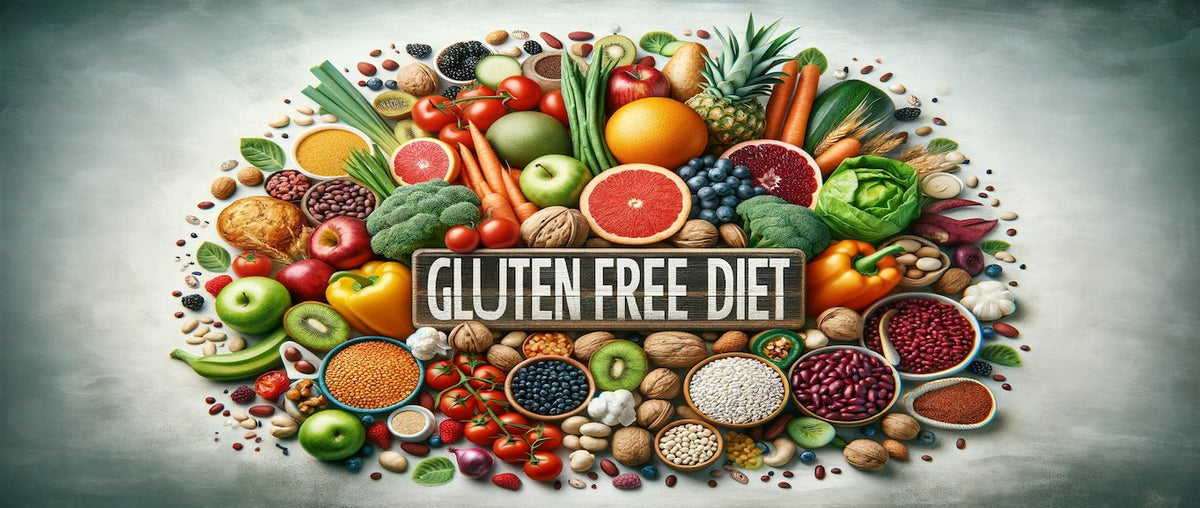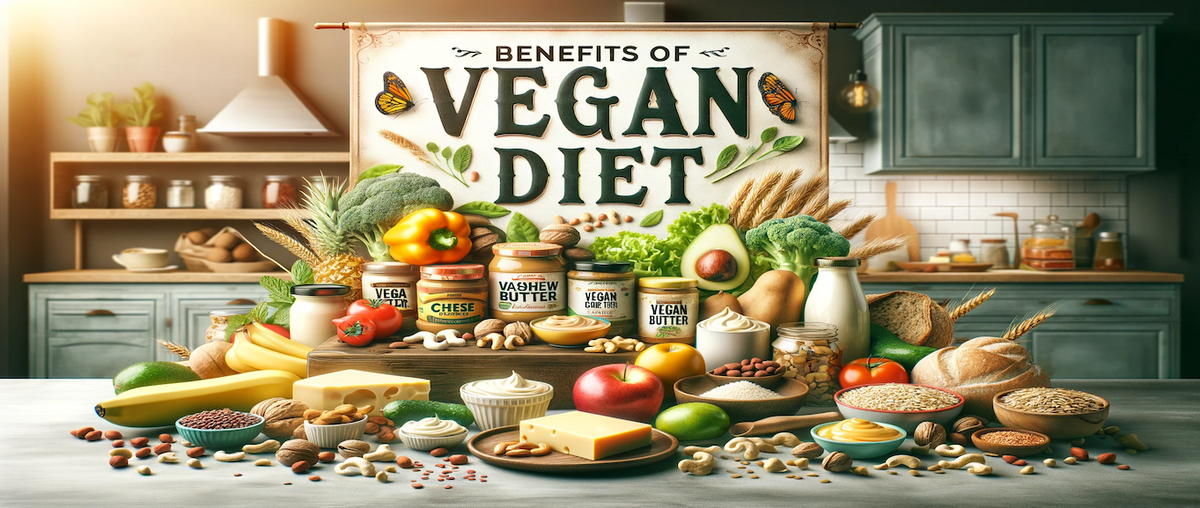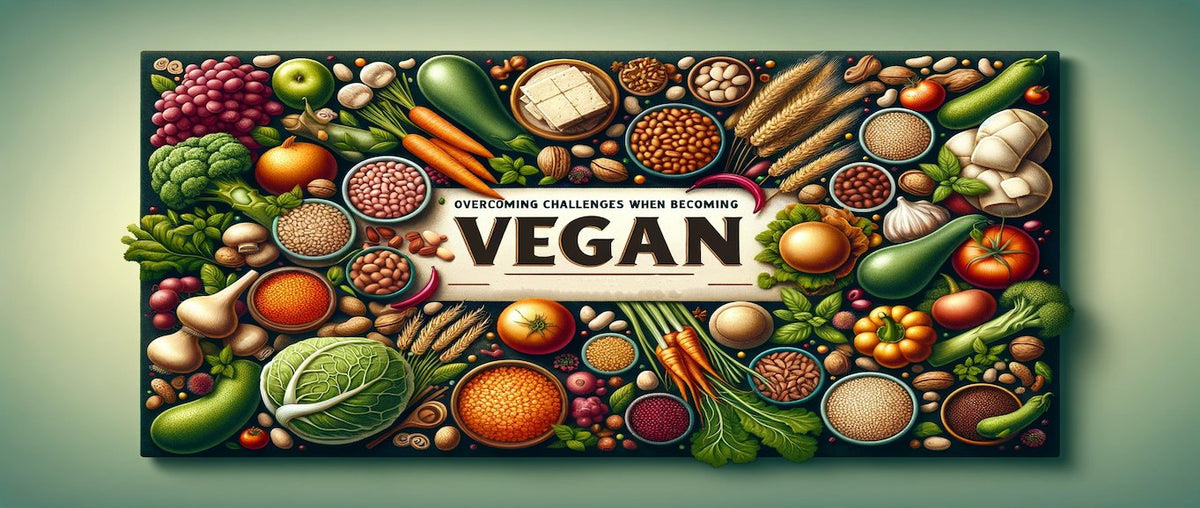Gluten Free Diet: Savor Health with Grabenord's Vegan Range
Gluten is a mixture of two proteins, gliadin and glutenin, primarily found in wheat, barley, and rye. It's responsible for the elasticity of dough, giving bread its sponge-like texture. Gluten acts as a binding agent, making it an essential component in many baking and cooking processes. However, for some individuals, gluten can trigger adverse health reactions. It's not just in obvious vegan food products like bread and pasta but can also be found in a variety of processed foods, often as a thickening or stabilizing agent.
Key Takeaways
- Understanding a gluten-free diet: basics, benefits, and challenges.
- Key strategies for managing a gluten-free diet effectively.
- Insights into plant-based, gluten-free dietary options.
What is a Gluten Free Diet?
A Gluten Free diet is an eating plan that excludes foods containing gluten, a protein found in wheat, barley, rye, and triticale (a cross between wheat and rye). This diet is crucial for managing celiac disease and other medical conditions associated with gluten. Recently, there's been a surge in the popularity of plant based Gluten Free diets, combining the health benefits of avoiding animal products with a Gluten Free lifestyle. Such diets emphasize natural, unprocessed plant foods, free from gluten, making them a wholesome choice for individuals looking for cholesterol free foods and plant based products .
Vegan Cheese and vegan butter , made without dairy or gluten, are excellent examples of how traditional products can be adapted to fit this diet. These alternatives not only cater to the dietary restrictions but also align with ethical and environmental values often associated with veganism.
Reasons for Choosing a Gluten Free Diet
The primary reason for adopting a Gluten Free diet is to manage conditions like celiac disease, where gluten triggers an immune system response damaging the small intestine. For those with this condition, even a small amount of gluten can cause discomfort and health issues.
Another compelling reason for following a Gluten Free diet is non-celiac gluten sensitivity. Individuals with this sensitivity experience symptoms similar to those of celiac disease, such as abdominal pain and bloating, but without the intestinal damage.
Moreover, the trend towards plant based Gluten Free diet and plant based foods has been driven by the growing awareness of the health and environmental benefits of such diets. These diets often include a variety of vegan products like Cashew Butter, vegan mayo, and Fat Free Butter, providing delicious alternatives to traditional options.

What to Avoid on a Gluten Free Diet
Foods and Ingredients to Avoid
When following a Gluten Free diet, it's crucial to avoid all foods that contain gluten. This includes obvious sources like breads, pastas, and baked goods made with wheat, barley, or rye. However, gluten can also be found in less obvious products such as sauces, soups, and even some vegan food products. For instance, many pre-prepared soups and sauces use wheat as a thickening agent.
Additionally, it's essential to be cautious with certain plant based products and Vegan Shop items, as they might contain gluten-containing ingredients for texture or flavor. This is why reading labels is paramount in a Gluten Free diet, not just for the presence of gluten but also for overall nutrient levels, particularly in processed foods.
Ingredients to Look Out For
Gluten can hide under various names on ingredient labels. Apart from wheat, barley, and rye, look out for terms like bulgur, seitan, farro, and durum. Even some less obvious ingredients like malt, which is derived from barley, and brewer's yeast, often contain gluten. Remember, wheat-free does not necessarily mean Gluten Free.
For those seeking Vegan products like Vegan Cheese or vegan butter, it's important to ensure they are labeled Gluten Free. The rise of plant based Gluten Free diet options has increased the availability of Gluten Free alternatives in the vegan shop sections, including items like cashew butter and vegan mayo, which are both Gluten Free and vegan.
The Health Impacts of a Gluten Free Diet
Benefits and Risks
While a Gluten Free diet is essential for individuals with celiac disease, its adoption by those without gluten-related medical conditions has sparked a debate. The benefits claimed by proponents of the diet include improved health, weight loss, and increased energy. However, scientific research on these benefits is still ongoing.
One significant risk of a Gluten Free diet, particularly if not well-planned, is the potential for nutritional deficiencies. Gluten-containing grains are a key source of vitamins and minerals such as iron, calcium, fiber, thiamin, riboflavin, niacin, and folate. Therefore, when adopting a plant based Gluten Free diet, it is crucial to find alternative sources of these nutrients.
Pros and Cons of a Gluten Free Diet
The pros of a Gluten Free diet, especially for those with celiac disease or gluten sensitivity, are clear: it reduces symptoms and promotes gut healing. For individuals without these conditions, the benefits might be less pronounced.
On the con side, Gluten Free diets can be more expensive and less convenient, given the higher cost of Gluten Free foods and plant based products. There's also a risk of consuming higher amounts of fats and sugars found in some Gluten Free processed foods, which could negatively impact overall health.
Integrating plant based Choices
Naturally Gluten Free plant based Foods
The beauty of a plant based Gluten Free diet lies in its variety and nutritional richness. Foods like fruits, vegetables, beans, legumes, and nuts are naturally Gluten Free and form the cornerstone of this diet. These foods are not only safe for those avoiding gluten but also contribute to a well-rounded, nutrient-rich diet, which is a key aspect of plant based foods.
Moreover, the rise in popularity of vegan products has led to a wide array of choices in vegan shops, including items like vegan cheese and vegan butter, which cater to both Gluten Free and vegan diet. Cashew butter and vegan mayo are also excellent Gluten Free, plant based alternatives that add flavor and richness to meals without compromising health goals.
Safe Grains in a plant based Gluten Free Diet
While traditional grains like wheat, barley, and rye are off-limits on a Gluten Free diet, there are many other grains that are safe and nutritious. Grains such as quinoa, rice, amaranth, and millet are not only Gluten Free but also align with a plant based diet, offering essential nutrients and variety. These grains can be used in a range of dishes, from breakfast cereals to hearty main courses, providing versatility in a plant based Gluten Free diet.

Gluten Free Diet in Daily Life
Reading Food Labels
Navigating food labels is a critical skill for anyone on a Gluten Free diet. The U.S. Food and Drug Administration mandates that foods labeled Gluten Free must have fewer than 20 parts per million of gluten. However, understanding labels goes beyond looking for the Gluten Free tag. It's about identifying hidden sources of gluten in ingredients lists and being aware that products labeled wheat-free may still contain gluten. This is especially important when purchasing plant based products and cholesterol free foods, as they might not always be Gluten Free.
Cross-Contamination and Safety Tips
Cross-contamination is a significant concern for those on a Gluten Free diet. It can happen anywhere - in the kitchen, at a restaurant, or even in packaged foods. Using separate cooking utensils and storage containers is crucial to avoid accidental gluten exposure. When shopping for plant based foods or visiting a vegan shop, be vigilant about cross-contamination risks, especially with bulk bins or shared preparation areas.
Also Read
Challenges and Solutions
Managing Nutritional Deficiencies
One of the challenges of a Gluten Free diet is ensuring adequate intake of essential nutrients. Gluten-containing grains are a significant source of vitamins and minerals, so their absence requires careful dietary planning. Incorporating a variety of plant based foods such as quinoa, brown rice, and legumes can help maintain balanced nutrition. These foods provide essential nutrients like fiber, iron, and B vitamins, which might be lacking in a strictly Gluten Free diet. Additionally, consuming fortified Gluten Free products and considering supplements, as recommended by a healthcare professional, can be beneficial.
Cost and Availability of Gluten Free Products
While Gluten Free diets have become more mainstream, the cost and availability of Gluten Free foods and plant based products can still be a hurdle. Gluten Free alternatives, such as vegan cheese or vegan butter, often come with a higher price tag compared to their conventional counterparts. To manage costs, focus on naturally Gluten Free and plant based whole foods like fruits, vegetables, and grains like rice and quinoa. These are generally more affordable and are a healthier choice compared to processed Gluten Free products.
Gluten Free and plant based Recipes
1. Quinoa and Black Bean Salad
A protein-rich salad combining cooked quinoa, black beans, fresh vegetables, and a tangy lime dressing.
2. Stuffed Bell Peppers
Bell peppers filled with a mixture of rice, lentils, and your choice of vegetables, baked to perfection.
3. Cashew Butter Stir-Fry
A stir-fry of your favorite vegetables and tofu, sautéed in a savory sauce made with cashew butter and Gluten Free tamari.
4. Chickpea Flour Pancakes
Savory pancakes made from chickpea flour, ideal for a Gluten Free breakfast or brunch.
These recipes not only cater to dietary restrictions but are also aligned with healthy, plant based eating.
Conclusion
Embracing a Balanced Gluten Free, plant based Lifestyle
Adopting a plant based Gluten Free diet is more than just a dietary change; it's a lifestyle choice that can have profound effects on one's health and well-being. While it comes with its challenges, such as managing nutritional deficiencies and navigating the cost and availability of Gluten Free foods, the benefits can be significant, especially for those with gluten-related disorders.
Remember, a Gluten Free diet isn't inherently healthier unless it's well-planned and balanced. Focusing on whole, naturally Gluten Free plant based foods and incorporating a variety of grains, legumes, fruits, and vegetables can ensure a nutritious and enjoyable diet. Whether you're exploring vegan products in a vegan shop or cooking your own meals with vegan cheese or vegan butter, the options are plentiful and diverse.
In conclusion, a plant based Gluten Free diet offers an opportunity to explore new foods and flavors while promoting health and well-being. With careful planning and a focus on natural, whole foods, it's possible to enjoy a rich and varied diet that satisfies both the palate and nutritional needs.
Craving a delicious vegan meal? Look no further! We've got a guide to the best Vegan Restaurants in India, ready to help you discover amazing plant-based eats in your city.










